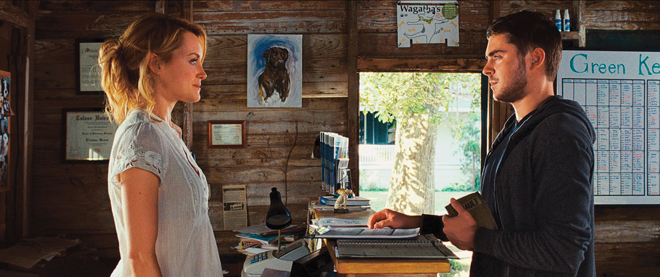What makes Nicholas Sparks fly
The king of hardcover, and Hollywood, romance reveals the secret to his massive box-office success
Share

Men might have reason to be pissed at Nicholas Sparks. If he were just a novelist, he could be forgiven. Women would read his fiction, alone, and dream. But his bestselling books are routinely transformed into hit movies, date movies, featuring men who set the bar for romantic behaviour impossibly high. Worse, they are played by Hollywood specimens of swoon-inducing masculinity who make the rest of us look like goofs—Ryan Gosling in The Notebook (2004), Channing Tatum in Dear John (2010), and now Zac Efron in The Lucky One. While it may be imprecise to call these movies chick flicks (more on that later), they do score with women. Sparks is the ultimate box-office pickup artist. So no matter how many critics dismiss him, you have to wonder: what’s his secret?
Interviewing the author last week in Toronto, it seemed rude to mention the f-word—formula. No writer likes to admit he has one. But if anyone has a logarithm for romantic drama, it should be Sparks. Since selling his first novel, The Notebook, for a $1-million advance at 30, he has become the king of hardcover, and Hollywood, romance. He has published 16 bestsellers in 15 years. Six have been hit movies, each grossing more than $110 million. A seventh, The Lucky One, opens next week. Another two will be shot this year, and two more are in development. “The others we’re holding back,” says Sparks, who also serves as a producer on his adaptations. “We don’t want to be overexposed.”
The 46-year-old author—a staunch Roman Catholic who has five children and lives in North Carolina—is a buoyant figure, brimming with cheerful confidence in his own talent. “It’s so easy to write good, it’s a joke,” he says. “It’s even easier to write average. I can do it in my sleep.” What’s hard is “to try to do what I do, to walk that fine line between the familiar and the cliché—between evoking an emotion and manipulating it. I try my best not to verge into melodrama. Some people say: failed!” Sparks shrugs. His box-office success may be offset by harsh reviews, but he can afford to ignore them.
In a movie culture awash with romantic comedy, Sparks supplies Hollywood with uncynical love stories designed around tragic flukes of destiny. In The Lucky One, a U.S. Marine named Logan (Efron) finds a woman’s photo in the rubble of an Iraq firefight. Back home, after trekking across America with his dog, Zeus, he tracks her down and takes a job at her family-run kennel—without revealing his connection. Beth (Taylor Schilling), a single mom divorced from the local badass sheriff, is skeptical at first. But romance blooms as the perfect stranger turns into a perfect dad for her young son, while his secret sits like a bomb waiting to go off.
Sparks insists his heroes are not too good to be true. “I simply create the character your mother told you to be,” he says. “Be honest, work hard, don’t look down on others, women and children in the lifeboats first.” The Marine in The Lucky One, he adds, “is strong and silent, but he’s struggling with PTSD.” Asked about the “chick flick” label, he demurs. “There are worse definitions. My audience is more female than male, but less than you’d think. You gotta wonder what they’d call Casablanca or From Here to Eternity.”
Veteran producer Denise Di Novi, a collaborator on five Sparks films, says, “What defines a chick flick is that the number-one goal is to find a man. When we create a female character, she’s not defined by the man. That’s a massive difference. The other distinction is that our male characters are always equal to the women in dimension and intensity.”
Whether or not he has a formula, Sparks does have a system. He maps out every plot twist in advance, right up to the ending. “Every element has to be original, interesting and universal,” he explains. “Soldier finding the photograph. Kind of interesting. Original. Yet it feels like it could happen to anyone. Universal. Boom! A plot element.” The fact that every book will be a movie—and can be sold to Hollywood before it’s written—“raises the hurdle” for originality. “I have to watch other films,” he says. “I can’t write a love story set on the Titanic.”